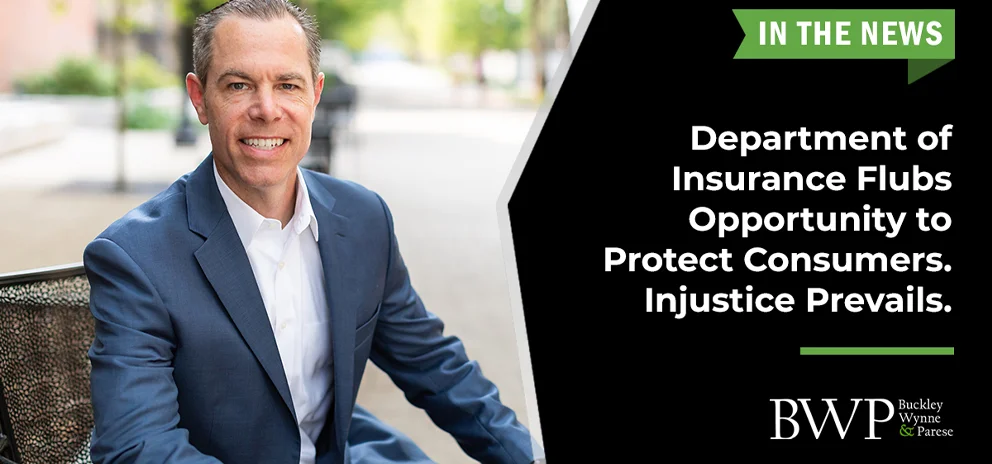Department of Insurance Flubs Opportunity to Protect Consumers. Injustice Prevails.
State Farm’s indiscretions in the processing of auto body repair claims seems to have gotten worse lately. I’m not alone in noticing this. By way of example, I recently had a client who was hit by a State Farm insured. State Farm immediately accepted liability. My client’s vehicle was at the repair shop when it was deemed a total loss. My client called me to report that the only way State Farm would give him a total loss figure was if he authorized State Farm to move the vehicle to Copart. I was aghast.
I called State Farm to inquire. I was advised of the same thing: my client must immediately release his vehicle to Copart, and only then, would State Farm take up the business of doing a total loss evaluation. This was subsequently verified by a supervisor who relayed that this was State Farm’s policy. I presume a new policy.
I wrote to State Farm to document this insanity and simultaneously filed complaints with the Department of Insurance (DOI) and Attorney General’s (AG’s) office. The letter and complaints read in part:
This will confirm that on July 12, 2023, I was explicitly informed by State Farm that the only way it would give Mr. K. a total loss payout figure was if Mr. K. first gave State Farm possession of his vehicle. I advised the total loss department that this was patently illegal. State Farm’s reply was essentially: this is our policy, take it or leave it. A few moments later, my assistant, Amanda Bolduc, spoke with a supervisor in the total loss department who confirmed that this was, in fact, State Farm’s policy, and that it would not, under any circumstances, give my client a payout figure unless and until he authorized the transfer of possession of the vehicle, which would be towed to Copart.
As you know, vehicles are moved around Copart with forklifts, causing irreparable damage. What is more, this transparent ploy to take my client’s vehicle in such a fashion, delay the total loss process, and effectively hold him hostage with no practical option but to accept a lesser figure is unlawful and in bad faith.
Connecticut General Statute § 38a-354 prohibits insurers from requiring that an appraisal be made in specified facility (such as Copart). The stated policy at issue explicitly violates this law. Appraiser Regulations § 38a-790-6 likewise prohibit insurance appraisers from forcing claimants to get an appraisal at a specified shop. Similarly, Connecticut General Statutes § 38a-816(6) outlines certain restrictions on unfair claims settlement practices. One restriction, for example, is not attempting in good faith to effectuate a prompt, fair and equitable settlement of a claim in which liability is reasonably clear.
On July 13, 2023, the vehicle was authorized for pickup. State Farm has still not made my client an offer. My client was forced to comply with State Farm’s unlawful demand and strong-arm tactic under protest because he has no alternative.
A copy of this letter is being sent to the Connecticut Department of Insurance and Attorney General’s Office with request that all State Farm employees involved in this unlawful exploitation be investigated. If this is, in fact, an official State Farm position and practice on total loss claims, we respectfully request that a cease and desist order be immediately issued to State Farm, and that all other appropriate sanctions and remedies be considered.
It’s possible that I’m overreacting to this. I do that from time to time. But this one strikes me as a particularly egregious practice, blatantly violative of our consumer protection laws, and clearly designed to (1) cheat consumers on the total loss value of their vehicles; and (2) cheat auto repair shops of their rightful storage fees.
If State Farm wants to take possession of a vehicle more hastily, thereby mitigating the damages its insured caused, it should do its work more quickly and make the victim an offer on the total loss sooner. Instead, what State Farm is doing here – and in the most obnoxious way possible – is demanding that the victim (1) give up his or her rights to their vehicle immediately without anything in exchange, (2) lose all negotiation leverage, (3) give up the opportunity to make a decision to retain the vehicle, and (4) hand State Farm on a silver platter the ability to delay payment on the claim and to underpay on the total loss.
State Farm has cleverly taken away victim rights while simultaneously making the victim responsible for keeping State Farm’s costs down. It’s amazing. This process ensures that victims will have to wait longer to get less money. When I learned this, I thought to myself: there is just no way any good faith consumer oversight authority such as the CT DOI would endorse what State Farm is doing. But that’s exactly what happened.
In response to my complaint, State Farm contended that moving the vehicle to Copart was necessary to “mitigate damages” and to allow State Farm “better access to the vehicle so that an accurate damage appraisal could take place upon inspection.” Both of these contentions are nonsense. Without any consideration for the victim’s rights or interest, the DOI effectively agreed with State Farm’s burden shifting scheme. The DOI also claimed to have found no violation of Connecticut law because State Farm “issued a letter stating the date they would pay for the storage fees and advised [the consumer when he] would be responsible for the storage fees after that date.” This too is utter nonsense. The DOI did not even address General Statutes § 38a-354 (our anti steering law – which was directly violated), or § 38a-790-6 (prohibiting appraisers from forcing consumers where to get appraisals done – which was also directly violated), or § 38a-816(6) (our unfair insurance practices law – which was also violated). Sending a letter explaining how you are violating the law does not make something lawful.
This is not the first time our Insurance Department has sought to insulate the insurance industry from legal accountability. I presume the cost benefit analysis is one premised on giving insurance companies greater latitude with regulatory compliance in order to keep jobs here in Connecticut. Whether letting insurers break our laws in order to keep jobs here makes any sense is a political calculation above my paygrade. But seeing it over and over from this side of the table is certainly frustrating. And there is a cost when our oversight institutions choose to look away so often. It’s born by motorist victims in their individual cases, but it’s also born on the rest of us. Ripples of mistrust reverberate when powerful corporations like State Farm are given a blessing to sidestep the law.
John M. Parese, Esq. is a Partner with the law firm of Buckley Wynne & Parese and serves as General Counsel to the ABAC. Buckley Wynne & Parese maintains offices in New Haven, Hartford and Stamford, and services clients throughout all of Connecticut. The opinions set forth in Attorney Parese’s articles are for education and entertainment purposes only, and should not be construed as legal advice or legally binding. If you have any questions or concerns about the content of this or any of Attorney Parese’s articles, you are encouraged to contact Attorney Parese directly.

Serving All of Connecticut
Free Evaluation 24/7
We understand the stress of dealing with an injury. Our team is here to provide compassionate support and effective legal representation, statewide.

